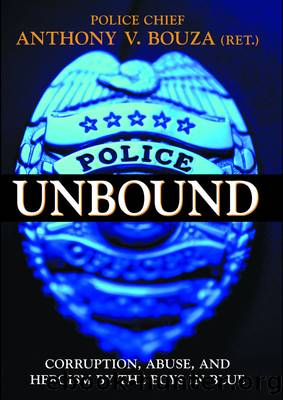Police Unbound by Anthony V. Bouza

Author:Anthony V. Bouza
Language: eng
Format: epub
ISBN: 9781615924868
Publisher: Prometheus
Published: 2015-04-23T16:00:00+00:00
POLICE CULTURE
Separated by a continent the LAPD and the NYPD could not have been more sharply contrasted, yet, internally, they remain alike in their worldviews. The inner cultures were tempered by attitudes toward brutality and corruption, and even such approaches as physical fitness—the LAPD prided itself on looking trim, military, and smart while the kindest thing that could be said of the NYPD is that its remained, in its appearance, socially relevant to its environment. But both agencies understood, in their very bones, that they were there to keep the underclass under control.
In the Bronx, the cops had dubbed the Forty-first Precinct “Fort Apache” before I arrived there and I had to force them to remove a sign reading “The Alamo” over the Forty-fourth Precinct. The cops saw the surrounding ghetto as a sea of hostiles they were there to put down and control. The notion of “protecting and serving” did not translate to the ghetto very faithfully.
The gigantic scandals involving the LAPD, uncovered in 1999 and 2000, had their roots in the cops’ styling of themselves as the “biggest, toughest, baddest gang” in a culture of gang violence. The cops defined it as a primitive struggle for control and acted on that premise. Law and the Constitution became irrelevant in this savage contest.
In tortured and distant relationship to the LAPD’s festering problems was the situation in Philadelphia, where in 1985 a black mayor allowed his white police chief to fire-bomb a radical back-to-Africa enclave called MOVE. The resulting fire razed sixty-one homes and took eleven lives, five of whom were children.
A task force was appointed that catalogued a raft of problems, none of which were significantly addressed before the city and its police lapsed back into their routine. By 2000 the city had spent $16.3 million to rebuild and repair the block but failed to satisfy the occupants who complained of shoddy construction.
I pointedly asked Philadelphia’s then commissioner about the accuracy of his famously low 1980s crime rates. He offered a two-word appraisal that confirmed my view and said it all: “They’re suspect.” An astonishing admission, and one he’d have certainly denied if I referred to it in any setting. As for those who’d cavil over the faded, historical references to statistical fudgings, we need only point to the disclosures in 2000 that the Philadelphia Police Department for years mislabeled rapes as lesser offenses or shelved the cases altogether.
Added to this was the new commissioner’s assertion that the city’s crime statistics were unreliable because, for years, they’d been canning. He, however, had to confront his own crisis with a videotaped display of his cops punching, kicking, and stomping a wounded black suspect in mid-July 2000. The suspect had been shot four times after shooting a cop in the hand and fleeing.
The more things changed . . .
In the late eighties, Philadelphia appointed a black police chief who failed to enact the needed reforms. Los Angeles, pressured to repudiate the shocking practices of the LAPD under Gates and impelled by the Warren Christopher Commission’s findings, undertook a search for a new and different chief.
Download
This site does not store any files on its server. We only index and link to content provided by other sites. Please contact the content providers to delete copyright contents if any and email us, we'll remove relevant links or contents immediately.
The Borden Murders by Sarah Miller(3581)
The Secret Barrister by The Secret Barrister(3003)
Coroner's Journal by Louis Cataldie(2095)
Police Exams Prep 2018-2019 by Kaplan Test Prep(2027)
The Splendid and the Vile by Erik Larson(1779)
Terrorist Cop by Mordecai Dzikansky & ROBERT SLATER(1715)
My Dark Places by James Ellroy(1497)
A Colony in a Nation by Chris Hayes(1493)
Black Klansman by Ron Stallworth(1436)
A Life of Crime by Harry Ognall(1376)
Objection! by Nancy Grace(1327)
Whoever Fights Monsters by Robert K. Ressler(1318)
The New Jim Crow by Michelle Alexander(1314)
American Prison by Shane Bauer(1284)
Obsession (The Volkov Mafia Series Book 1) by S.E Foster(1273)
Anatomy of Injustice by Raymond Bonner(1266)
The Art of Flight by unknow(1261)
A Higher Loyalty by Comey James(1237)
A is for Arsenic: The Poisons of Agatha Christie (Bloomsbury Sigma) by Kathryn Harkup(1210)
